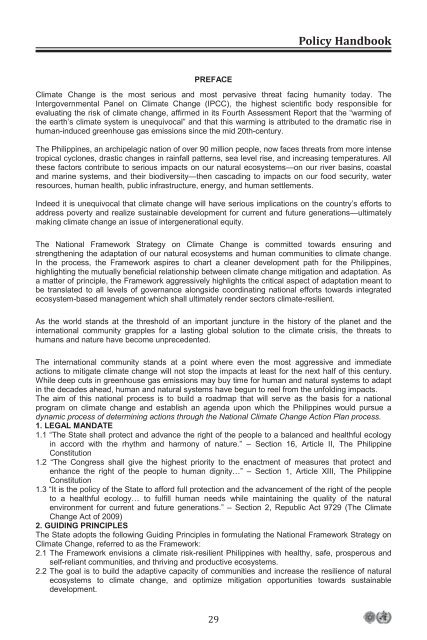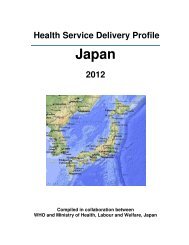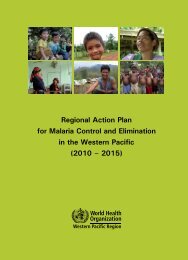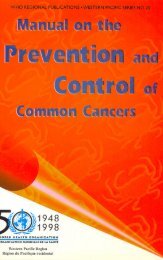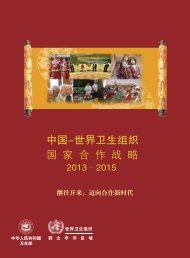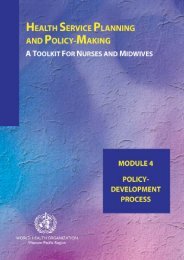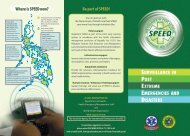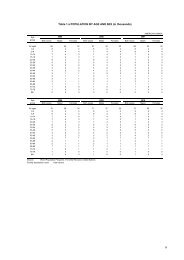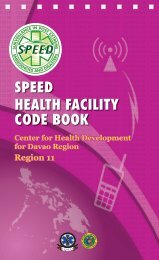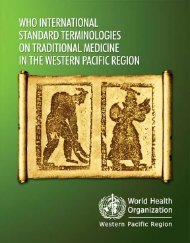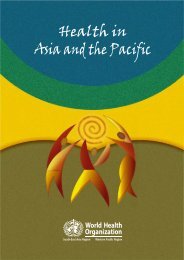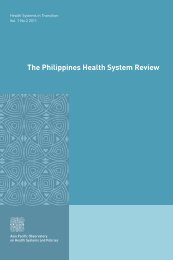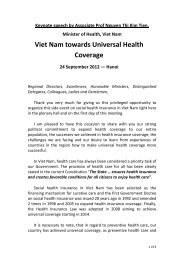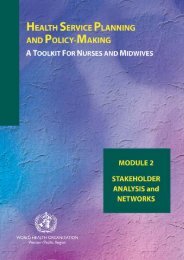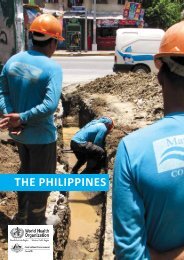Untitled - DOH
Untitled - DOH
Untitled - DOH
- No tags were found...
You also want an ePaper? Increase the reach of your titles
YUMPU automatically turns print PDFs into web optimized ePapers that Google loves.
Policy HandbookNational Framework Strategy on Climate Change 2010-2022PREFACEClimate Change is the most serious and most pervasive threat facing humanity today. TheIntergovernmental Panel on Climate Change (IPCC), the highest scientific body responsible forevaluating the risk of climate change, affirmed in its Fourth Assessment Report that the “warming ofthe earth’s climate system is unequivocal” and that this warming is attributed to the dramatic rise inhuman-induced greenhouse gas emissions since the mid 20th-century.The Philippines, an archipelagic nation of over 90 million people, now faces threats from more intensetropical cyclones, drastic changes in rainfall patterns, sea level rise, and increasing temperatures. Allthese factors contribute to serious impacts on our natural ecosystems—on our river basins, coastaland marine systems, and their biodiversity—then cascading to impacts on our food security, waterresources, human health, public infrastructure, energy, and human settlements.Indeed it is unequivocal that climate change will have serious implications on the country’s efforts toaddress poverty and realize sustainable development for current and future generations—ultimatelymaking climate change an issue of intergenerational equity.The National Framework Strategy on Climate Change is committed towards ensuring andstrengthening the adaptation of our natural ecosystems and human communities to climate change.In the process, the Framework aspires to chart a cleaner development path for the Philippines,highlighting the mutually beneficial relationship between climate change mitigation and adaptation. Asa matter of principle, the Framework aggressively highlights the critical aspect of adaptation meant tobe translated to all levels of governance alongside coordinating national efforts towards integratedecosystem-based management which shall ultimately render sectors climate-resilient.As the world stands at the threshold of an important juncture in the history of the planet and theinternational community grapples for a lasting global solution to the climate crisis, the threats tohumans and nature have become unprecedented.The international community stands at a point where even the most aggressive and immediateactions to mitigate climate change will not stop the impacts at least for the next half of this century.While deep cuts in greenhouse gas emissions may buy time for human and natural systems to adaptin the decades ahead, human and natural systems have begun to reel from the unfolding impacts.The aim of this national process is to build a roadmap that will serve as the basis for a nationalprogram on climate change and establish an agenda upon which the Philippines would pursue adynamic process of determining actions through the National Climate Change Action Plan process.1. LEGAL MANDATE1.1 “The State shall protect and advance the right of the people to a balanced and healthful ecologyin accord with the rhythm and harmony of nature.” – Section 16, Article II, The PhilippineConstitution1.2 “The Congress shall give the highest priority to the enactment of measures that protect andenhance the right of the people to human dignity…” – Section 1, Article XIII, The PhilippineConstitution1.3 “It is the policy of the State to afford full protection and the advancement of the right of the peopleto a healthful ecology… to fulfill human needs while maintaining the quality of the naturalenvironment for current and future generations.” – Section 2, Republic Act 9729 (The ClimateChange Act of 2009)2. GUIDING PRINCIPLESThe State adopts the following Guiding Principles in formulating the National Framework Strategy onClimate Change, referred to as the Framework:2.1 The Framework envisions a climate risk-resilient Philippines with healthy, safe, prosperous andself-reliant communities, and thriving and productive ecosystems.2.2 The goal is to build the adaptive capacity of communities and increase the resilience of naturalecosystems to climate change, and optimize mitigation opportunities towards sustainabledevelopment.2929


